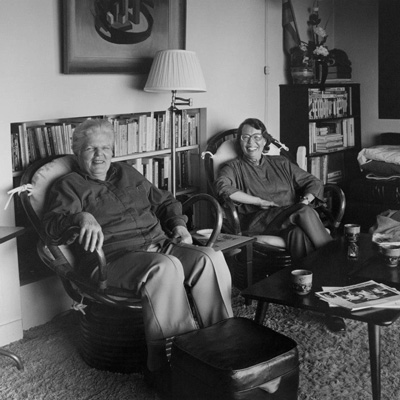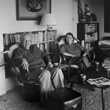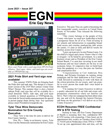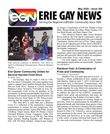San Francisco designates first landmark honoring lesbian history for longtime home of LGBTQ pioneers Phyllis Lyon and Del Martin

Photo: Martin and Lyon in their living room c. 1990s (courtesy GLBT Historical Society)
The San Francisco Board of Supervisors approves ordinance by Supervisor Rafael Mandelman to establish landmark status for the home of beloved lesbian activists
SAN FRANCISCO - May 4, 2021 - On Tuesday, the San Francisco Board of Supervisors unanimously passed an ordinance authored by District 8 Supervisor Rafael Mandelman to designate the former home of pioneering LGBTQ and civil rights activists Phyllis Lyon and Del Martin as a local historic landmark. The Board will take a final vote on the ordinance at their May 11 meeting, after which the ordinance and landmark will be in effect in June.
"Phyllis Lyon and Del Martin were queer activists before queer activism was a thing. The modern LGBTQ rights movement is built on the foundations laid by these women and their contemporaries, and it is fitting that their home is the first San Francisco historic landmark dedicated to lesbian history," said Mandelman, who is the only LGBTQ member of the Board of Supervisors and represents the Noe Valley neighborhood where the home is located. "They shared this home for more than half a century and it has clear historic value that should be preserved and celebrated. Early LGBTQ leaders like Phyllis and Del changed the world for the generations of queer people that would follow."
The historic landmark status means that future development and alterations to the home would need special approval from the Historic Preservation Commission, a public process that would provide an opportunity for preservationists and members of the community to weigh in. The ordinance passed today would make the Lyon Martin House only the sixth local historic landmark associated with LGBTQ history in San Francisco, and the first focused on the history of the lesbian community in particular.
The landmarking was prompted by the recent sale of the property where Martin and Lyon lived together and nurtured a movement from 1955 until Martin's death in 2008, and where Lyon remained until her death in April 2020. The home, a 750 square foot cottage atop a steep hill in San Francisco's Noe Valley neighborhood, sold for $2.25 million in September, along with an adjacent undeveloped lot that was not included in the landmark. The property offers a stunning view of the city skyline and was advertised as "the very last parcel of land atop Noe Valley" and "truly the last of its kind." The centrally located Noe Valley neighborhood has seen a rash of redevelopment in recent years featuring large, luxury homes that routinely sell for $6 million and above and often replace modest homes originally built in the early parts of the 20th century, like the Lyon Martin house.
The sale caught the attention of Shayne Watson, a historian who co-wrote San Francisco's LGBTQ Historic Context Statement in 2016. "I was alarmed when I saw an article about the sale touting how profitable it would be to redevelop the property," recalled Watson. "The Lyon-Martin house is not only one of the most significant queer sites in the city, but a place of international importance - truly a birthplace of LGBTQ-rights movements worldwide."
Lyon and Martin, journalists who met when they were living in Seattle before moving back to San Francisco to live together in 1953, would continue as trailblazers across many social issues. Together, the women founded the Daughters of Bilitis, the first lesbian rights organization in the United States, which published the nationally-distributed newsletter The Ladder, hosted national conventions, and organized private social gatherings that were the only places for lesbians to gather freely at the time. In 1964, they helped found Citizen Alert, an early policy watchdog program focused on police brutality and unequal law enforcement. In 1976, Martin published Battered Wives, one of the earliest books on domestic violence published in the United States. In 1995, they were appointed to the White House Conference on Aging by Senator Dianne Feinstein and Congresswoman Nancy Pelosi. In 2004, they became the first same-sex couple to legally wed in San Francisco when then-Mayor Gavin Newsom ordered the County Clerk to grant marriage licenses to same-sex couples.
"For far too long, places that record the achievements of women and the LGBTQ community have been overlooked by official designation programs across the country. The community-driven effort to recognize and protect the home of Phyllis Lyon and Del Martin confronts that systemic disparity by shaping a more truthful and inclusive American story," said Christina Morris, manager of the Where Women Made History campaign at the National Trust for Historic Preservation. "The Lyon-Martin House landmark is a powerful symbol of how these two women's lifetime of activism against discrimination and injustice changed their community for the better and changed the world."
Imani Rupert-Gordon, Executive Director for the National Center for Lesbian Rights (NCLR), said "NCLR is thrilled to see the longtime residence of lesbian icons Del Martin and Phyllis Lyon receive the historic designation it deserves, making it the first landmark on the West Coast with a lesbian focus. From the more than 50 years of devoted partnership that Phyllis and Del shared in that home, to meetings of key leaders in the LGBTQ movement from the 1950s through marriage equality, their Noe Valley home played a pivotal role in both the lesbian rights and the broader LGBTQ rights movement for many years. It is inspiring to see that history preserved for future generations and to know that their legacy will live on."
The preservation effort was spearheaded by Watson, who brought together historians, friends and former caregivers of Lyon and Martin, and members of the broader queer community to establish the Friends of the Lyon-Martin House in partnership with the GLBT Historical Society. The groups worked with Mandelman to introduce a resolution in September 2020 that initiated the process that culminated in Tuesday's vote to landmark the historic home, following the recommendation of the City's Historic Preservation Commission in February.
"From Shayne Watson's first call to action to now, the landmarking of Phyllis Lyon and Del Martin's home has been a model of community activism in the name of historic preservation," said Terry Beswick, Executive Director of the GLBT Historical Society, whose archives include the papers of Lyon and Martin. "Too often, historic LGBTQ sites have been regarded as worthless, and without these concerted efforts, this structure would doubtless be bulldozed into dust. I'm excited to see what we are able to do with the property to commemorate its remarkable history, and while this is the first lesbian-specific site of historic significance to be landmarked in the western United States, I hope there are many more to follow."




